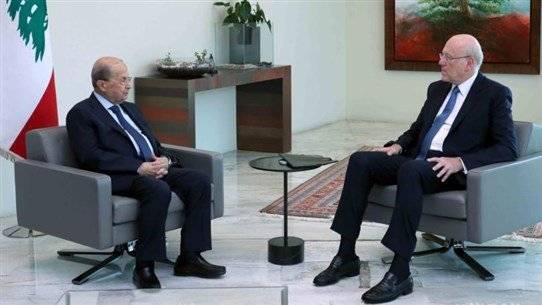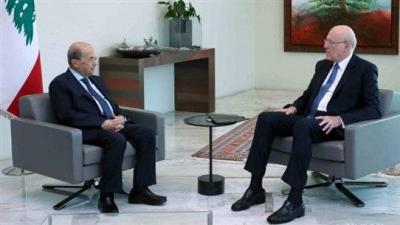The race for the Lebanese presidency seems timid, if not nonexistent, with Lebanon just over three months away from President Michel Aoun's term ending on October 31. He has assured several foreign ambassadors in Lebanon that he will not remain in Baabda Palace for even a minute after his term ends, despite his political team's ongoing legal studies that claim his powers cannot be transferred to the caretaker government (headed by Najib Mikati) contrary to the provisions of the Lebanese constitution.
Aoun's opponents argue that it is unacceptable for the president to link his departure from the presidential palace to the formation of a fully-fledged government (headed by the designated president Mikati), while he insists on obstructing all efforts to replace the caretaker government with an effective one. They tell Asharq Al-Awsat that they are not inclined to grant Aoun a political gift by forming a government tailored to the ambitions of his political heir, MP Gibran Bassil, as his term nears its end; especially since anyone who has failed to fulfill their commitments during their presidency cannot, in a few months, compensate for their shortcomings in saving the country.
They point out that Aoun seeks to form a government in which he maintains significant control, but sees this as a partnership with Mikati to ensure his signature on the decrees of its formation, thereby returning control to Bassil. They assert that Aoun's dealings with Mikati echo the same scenario he used with former Prime Minister Saad Hariri, which led to Hariri's withdrawal from forming a government. The strategy that Aoun crafted during his negotiations with Hariri closely mirrors his current approach with Mikati, though there is a significant difference: Mikati currently combines his role as head of the caretaker government with being designated to form the new government, and Aoun is nearing the end of his presidential term.
These opponents draw attention to the similarities between the strategies Aoun employed to push Hariri to withdraw and those he is currently following to encourage Mikati to do the same, although he is fully aware that Mikati has no intention of resigning as a free gift to Bassil. They emphasize that Bassil, along with his uncle, aimed to appoint a political figure loyal to him to form the government; however, the "Shiite duo" (Hezbollah and Amal) intervened to disable the political trap prepared by Bassil before it could explode, which forced him to rely on his uncle to block Mikati's government formation, despite Bassil now playing the role of a partner in its formation while being at odds with Mikati after having rejected his nomination and announcing his refusal to participate in the government or grant it confidence.
Aoun's opponents see his political team attempting to place the blame for the government's formation delay on Mikati, claiming he is under external pressure in line with his desire not to form it. This repetition mirrors what Aoun and Bassil previously stated to justify the organized campaign they oversaw, which led to Hariri's withdrawal from forming the government.
They add that instead of clarifying his stance on the ministerial cabinet that Mikati presented to him, Aoun quickly leaked the cabinet lineup through his political team, openly criticizing it. They note that he employed the same tactic with Hariri when he sent him a copy of the sectarian distribution of the ministerial portfolios via a messenger with an envelope addressed to "Mr. Saad Hariri," rather than addressing him as the designated prime minister.
Aoun's opponents accuse his political team of circumventing constitutional provisions related to government formation, specifically regarding the inclusion of his partnership in the process, despite the constitution granting the designated prime minister the right to choose ministers in consultation with the president, limiting the latter's partnership to signing the formation decrees. The prime minister is held accountable by the parliament, can withdraw confidence from the government, while Aoun bears no responsibility and continues his term until its conclusion, unlike Mikati.
They note with concern Aoun's political team's claim that Mikati, due to his abstention from elections, lacks representation. They argue that Bassil is acting alone in obstructing government formation and would be mistaken to think he could leverage strength against the designated prime minister due to disunity in the Sunni street or by betting on a French role similar to the one Paris played during Hariri's assignment, urging the latter to meet Bassil to facilitate the cabinet formation.
Paris is seeking to understand the situation in Lebanon, which explains Ambassador Anne Grillo's communication with Hezbollah amidst reports that ongoing talks between Paris and Tehran align with the resumption of indirect negotiations between Lebanon and Israel for maritime border delineation through American mediation. Therefore, Aoun and Bassil lack external support to hinder government formation, unlike the international backing for Mikati that recently surfaced in a Security Council statement encouraging parties to expedite government formation, aimed at those willing to listen but not those looking to seize government control in anticipation of the potential inability to elect a new president during the constitutional timeframe.
Aoun's opponents assert that the presidential election will be completed on time and that the failure to form a government serves as leverage to prevent a presidential vacuum, as the country cannot endure two vacuums: governmental and presidential.
Thus, the race for the presidency has yet to publicly emerge, lacking the necessary political communication within the team, suggesting that everyone is monitoring regional movements before committing to any decisions. This implies that Speaker Nabih Berri's initiative to call the deputies for the first session to elect a president remains limited to mobilizing the presidential battle in the absence of candidates, particularly those outside the traditional cadre, whose names are occasionally circulated without focusing on a specific nominee.




